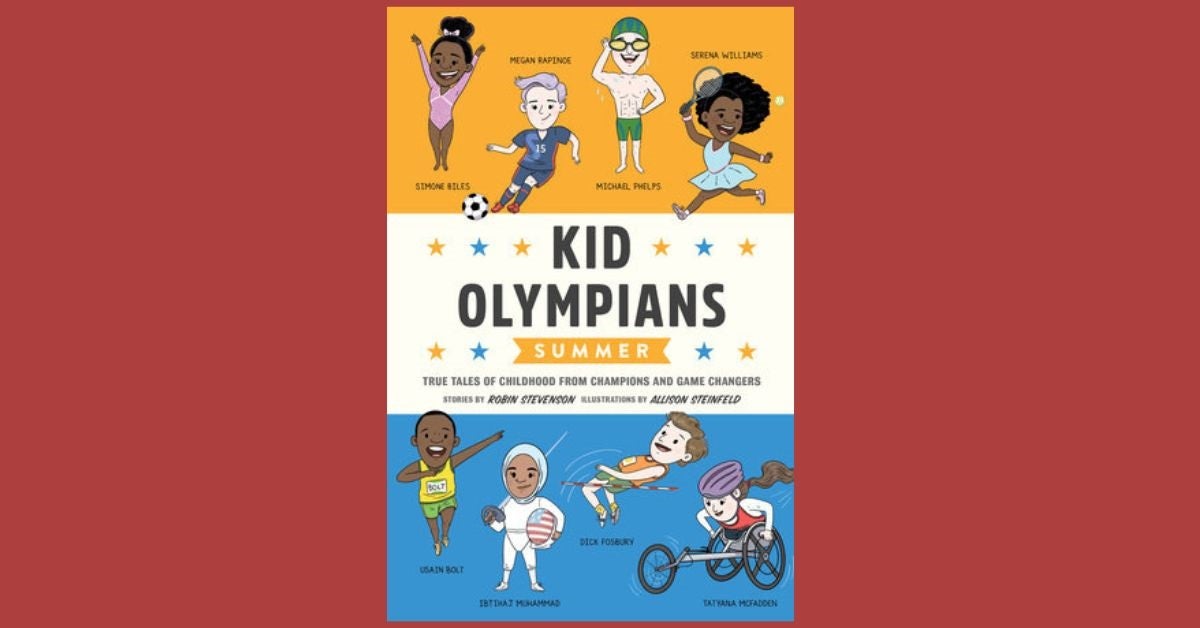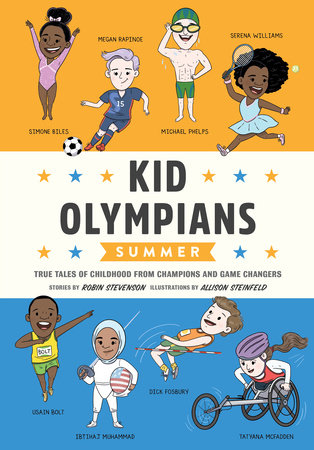Kid Olympians: Summer is the latest entry in the beloved Kid Legends series, from award winning author Robin Stevenson.
Triumphant, relatable, and totally true biographies tells the childhood stories of a diverse group of international athletes who have captured the world’s attention at the Summer Olympics and Paralympics, like Simone Biles, Jesse Owens, Naomi Osaka, Tatyana McFadden, Yusra Mardini, and eleven other incredible olympians–including Michael Phelps, excerpted here!
Michael Phelps was born on June 30, 1985, in Baltimore and raised in the nearby suburb of Towson. His mom, Deborah Sue (or Debbie), was a home economics teacher and his dad, Michael Fred Phelps, was a Maryland state trooper. Michael was the baby of the family. His older sisters, Hilary and Whitney, were seven and five years old when he came along.
Right from the start, Michael was a high-energy kid who got into everything. “Whatever it was, if it was breakable, I usually found it,” he said. “I simply could never sit still.” Even at the dinner table, he had to be busy. He would play with the saltshaker or twirl a steak knife between his fingers. He’d play with his food too, mixing everything on his plate together and adding sugar and mayonnaise as if he was making a casserole. Sometimes he’d pour milk on top and eat the resulting concoction. “It drove my mom crazy,” he said.
To make matters worse, he never seemed to listen to warnings. One night at a Mexican restaurant, his parents told him to be careful of the hot sauce. Michael couldn’t resist the challenge—and besides, he thought, it looked just like ketchup. He dumped a huge spoonful of hot sauce on a tortilla chip and popped it in his mouth. Instantly, his eyes began streaming with tears as he waved his arms frantically. Way too hot!
When Michael was seven, he came home one day to find his sisters in tears. His mom explained to Michael that she and his dad were separating. Around this time, Michael learned to swim. Both of his older sisters were swimmers, so Michael had grown up around the pool and was excited to finally get in the water. But the pool wasn’t anything like he had expected, and at first, he hated it. “We’re talking screaming, kicking, fit-throwing, goggle-tossing hate,” he said. Most of all, he didn’t want to get his face wet. He made excuse after excuse: he was too cold, he had to go to the bathroom . . .
But his swimming teacher persisted, and Michael gradually became more comfortable in the water. Once he learned to swim, he loved it. “I felt so free,” he said. He swam every day and stayed in the water for as long as possible. Michael was a busy kid. In addition to swimming, he played lacrosse and baseball, and he enjoyed being around his sisters and his friends. But he was also a sensitive kid, and when his parents’ separation became a divorce, it hit him hard. Often, he felt abandoned by his father.
School was tough too. The other kids made fun of the way Michael spoke, teasing him about having a lisp.
Michael was self-conscious about his appearance as well; he thought his ears were much too big. He often wore a hat to make them look smaller, but other kids had figured out that teasing Michael about his ears was an easy way to get a reaction. Sometimes they would grab his hat and make comments about Spock, the Vulcan character from Star Trek with notably pointy ears. One of Michael’s teachers complained to his mom that he couldn’t concentrate on anything. But most people were more patient with him. His third-grade teacher told Michael it was healthy to have an “active personality.”
When Michael was in sixth grade, some of his school troubles started to make more sense after he was diagnosed with attention deficit hyperactivity disorder (ADHD). He began taking medication and found that it helped him focus. He didn’t take it on weekends, though, and at swim meets his behavior was sometimes a little wild. “I was either running off to the side to play with the other kids, banging my kickboard against the pool deck or sneaking to the front of the line to jump into someone else’s race,” he said. But despite his trouble focusing, Michael’s talent as a swimmer was undeniable. By the time he was ten, he held the national record for his age group in the 100-meter butterfly. At eleven he began training even more seriously. His new coach was named Bob Bowman. Bob was strict, and with him around, Michael couldn’t get away with anything—the coach seemed to have eyes in the back of his head! If Michael splashed a teammate or hid someone’s cap, Bob would notice. One of the swimmers stuck a sign on Bob’s door that said “Beware of Bob.”
During his years at Dumbarton Middle School, Michael continued to have challenges in the classroom. Writing was difficult for him. Sometimes he didn’t remember to hand in assignments, and sometimes he just didn’t bother doing them. His quick temper got him in trouble too; once, another kid kept flicking at Michael’s ears during a volleyball game, and Michael punched him. Michael was suspended, and his mom talked to him about learning better ways of resolving conflicts.
But he had a lot of fun with his friends at the pool. One of their games was speaking a made-up language called Bong. To speak Bong, you added -ong to the consonant sounds in a word and said the name of the vowels. The word hot, for example, would become hong- oh-tong. The best part about speaking Bong was that their coach couldn’t understand what they were saying.
Or so they thought. One day, Bob handed Michael a note with realistic goals to aim for at his next swim meets. To Michael’s shock, the note was written in Bong! Bob hadn’t been fooled by the made-up language at all.
In 1999, Michael started ninth grade at Towson High School. He really wanted to play football, and maybe golf as well, but finally realized that swimming wouldn’t leave him enough time for other sports. It was a sacrifice that he and his coach thought was worth making; Michael was winning races and breaking records, and Bob was starting to think that the Olympics were within reach. Sure enough, at age fifteen, Michael was on his way to Sydney for the 2000 Summer Olympics. He was the youngest swimmer on a US team since 1932. On the flight to Australia, one of the flight attendants invited Michael and the two other teenagers on the team to come up to the cockpit. They looked out the window and saw Sydney Harbor and the Opera House down below!
Michael enjoyed his first Olympics. He didn’t win any medals, but he swam well, clocking some of his best times ever. When he returned home, his mom arranged for a limousine to pick him up from the airport, and some of Michael’s friends came to meet him there. They took the limo to the 7-Eleven for celebratory Slurpees. When Michael arrived back at his high school, expecting to head to his usual classes, he was caught by surprise: the school had secretly planned a party. There were television cameras and banners, and people wearing buttons and T-shirts that said fly michael fly. Some of the other students even wanted his autograph!
In keeping with a US swim team tradition, Michael got a tattoo of the Olympic rings on his hip. He was already looking forward to the next Olympics, four years away—but no one could have predicted quite how successful he would be at them.
In 2004, Michael won eight medals—six of them gold—at the Summer Olympics in Athens. In Beijing in 2008, he won another eight gold medals—one in every event he entered, seven of them in record-breaking time. No athlete had ever won so many medals at a single Olympics! At the London Games in 2012 and then Rio de Janeiro in 2016, Michael continued to break records and collect medals—in fact, at four Olympic Games in a row, he won more medals than any other athlete. He is considered to be the greatest swimmer of all time.
Download the educator guide and trading cards.






